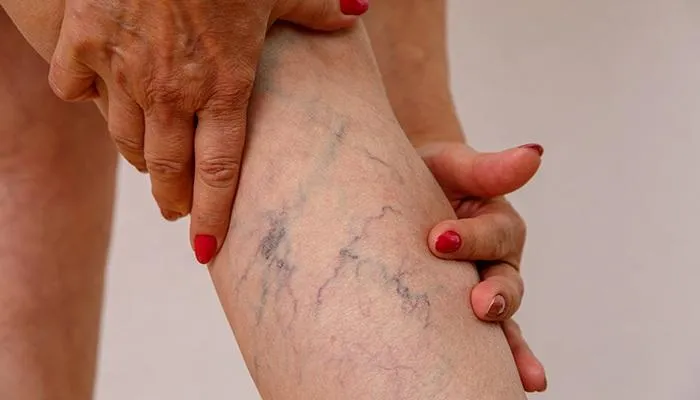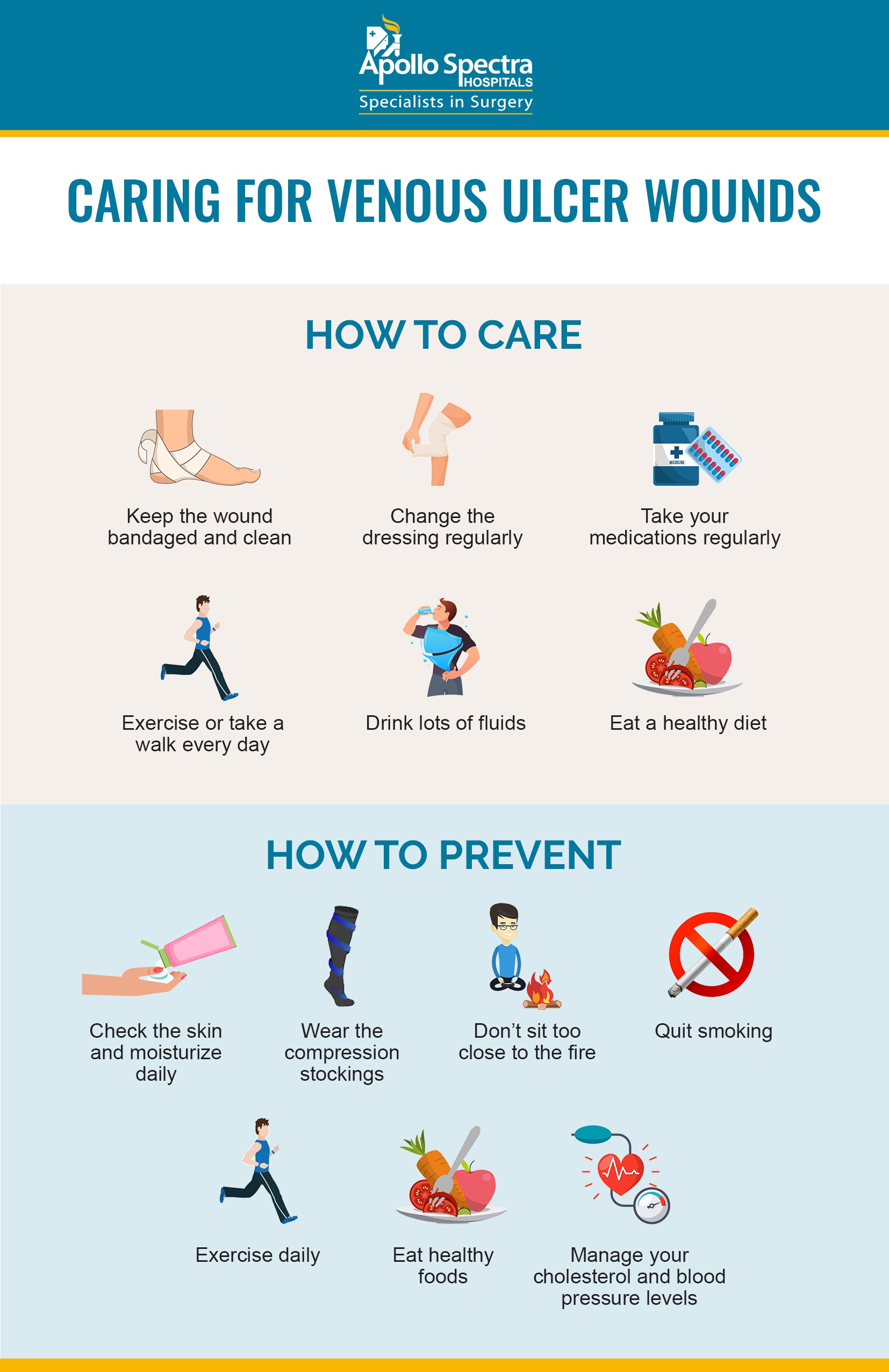Caring for Venous Ulcer Wounds
March 6, 2020

Venous Ulcer Wounds
Venous ulcers occur when the veins present in your legs stop pushing the blood back to your heart as they should. This blood starts backing up in the veins and builds up pressure. If this is not treated on time, the excess fluid and increased pressure in the affected area can result in the formation of an open sore. Usually, venous ulcers are formed on the leg, above the ankle. Also, they take time to heal.
The cause of venous ulcers is the development of high pressure in the veins. The veins consist of one-way valves that are supposed to keep the blood flowing back to the heart. When the veins get blocked or scarred or the valves become weak, the blood might flow backward and get pooled in the legs. This is known as venous insufficiency. This ultimately leads to the development of high pressure in the leg veins. This buildup of fluid and increased pressure can prevent oxygen and nutrients from getting to the tissues. This will cause the tissue to get damaged, cells to die, and a wound can form.
It is very important to take care of the wound. Here are some basic instructions that will help you with this:
- It is important to keep the wound bandaged and clean for preventing infection.
- Your doctor will tell you about when you have to change the dressing. Make sure that you follow it.
- You have to keep the dressing and the skin near it dry. The healthy tissue present around the tissue shouldn’t get wet. This will get it softened allowing the wound to get bigger.
- Before you apply the dressing, clean the wound properly by following the instructions of the doctor.
- Keep the skin around the wound clean and moisturized for protecting it. The skin near the wound has to be protected from the fluid draining from the wound. If it gets in contact with the fluid, the skin will start breaking down and the wound will get bigger.
- Wear bandages or compressions stockings over the dressing. They will help in preventing blood from pooling, reducing swelling and pain, and helping with healing.
- Try putting your feet above your heart at regular intervals. You can just lie down and use a pillow for putting your feet up.
- Don’t forget to take your medications as they will help in healing
- Exercise or take a walk every day. If you are staying active, your blood flow will improve.
- If even after this, your ulcer is not healing well, you might have to undergo a procedure or surgery for improving the blood flow through the veins.
- Your doctor might give you instructions for compressions therapy. In this case, you will be using special leg bandages or wearing compression stockings for applying pressure to the wound and nearby skin. These will also help your muscles in pushing the blood back up through the veins. The swelling in your leg will also be reduced.
- Drink lots of fluids and eat a healthy diet.
Once your ulcer has healed, you still need to take care of the area. You don’t want the ulcer to return. Here are some ways for preventing the led ulcer from returning:
- Checking the skin and moisturizing daily.
- Wear the compression stockings. These support stockings will be stretching over time. So, every 3 to 6 months, you need to replace them for maintaining the right compression level.
- Try to not injure your legs.
- Don’t sit too close to the fire. You don’t want your skin exposed to extreme temperatures.
- Keep checking your legs and feet every day including tops, bottoms, heels, and ankles. Also, look for any changes in skin color or cracks.
Apart from these, you also need to incorporate some lifestyle changes that will be aiding healing, improving blood flow and preventing future venous ulcers:
- Quit smoking as it is bad for the blood vessels.
- Exercise daily. This will help your blood flow.
- If you are overweight, lose weight.
- If you have diabetes, try keeping your blood sugar level under control. This will make the wound heal faster.
- Get proper sleep at night.
- Eat healthy foods.
- Manage your cholesterol and blood pressure levels.
Even after all this, it is possible that your venous ulcer wound will get infected. Here are the signs of infection and if you see them, you should visit a doctor immediately:
- Increased warmth around the wound
- Swelling
- Redness
- Odor
- Bleeding
- Increased pain
- Fever or chills
Consult General Surgeon Dr. Nanda Rajaneesh
Our Doctors
DR. DEVANSH ARORA
MBBS, MS...
| Experience | : | 4 Yeras Experience |
|---|---|---|
| Speciality | : | General Surgery, Lap... | Location | : | Vikas Nagar |
| Timings | : | ON CALL... |
DR. L.N. ARORA
MBBS, MS...
| Experience | : | 36 Yeras Experience |
|---|---|---|
| Speciality | : | General Surgery, Lap... | Location | : | Vikas Nagar |
| Timings | : | ON CALL... |
DR VIJAY KUMAR MITTAL
MBBS,MS,FRCS...
| Experience | : | 30 Yeras Experience |
|---|---|---|
| Speciality | : | General Surgery, Lap... | Location | : | Agam Kuan |
| Timings | : | Mon - Sat : 12:00 PM... |
DR SAMIR GUPTA
MBBS,MS,MCH...
| Experience | : | 11 Yeras Experience |
|---|---|---|
| Speciality | : | General Surgery, Lap... | Location | : | Vikas Nagar |
| Timings | : | Mon - Sat : On Call... |
DR. PARVEZ ANSARI
M.B.B.S; D.N.B ( GEN...
| Experience | : | 12 Yeras Experience |
|---|---|---|
| Speciality | : | General Surgery, Lap... | Location | : | Kondapur |
| Timings | : | Mon - Sat : 5:30 PM ... |
DR. LAKIN VIRA
MBBS, DNB (General S...
| Experience | : | 13 Yeras Experience |
|---|---|---|
| Speciality | : | General Surgery ... | Location | : | Tardeo |
| Timings | : | Mon, Wed, Fri : 12:0... |
DR. SANJAY BORUDE
MBBS, MS (General Su...
| Experience | : | 40 Yeras Experience |
|---|---|---|
| Speciality | : | General Surgery ... | Location | : | Tardeo |
| Timings | : | Mon - Fri : 2:00 PM ... |
DR. AMOL WAGH
MBBS, MS (General Su...
| Experience | : | 22 Yeras Experience |
|---|---|---|
| Speciality | : | General Surgery ... | Location | : | Tardeo |
| Timings | : | Tue, Thur, Sat : 4:0... |
DR. DEVBRATA ADHIKARI
MBBS, MS (General Su...
| Experience | : | 23 Yeras Experience |
|---|---|---|
| Speciality | : | General Surgery ... | Location | : | Tardeo |
| Timings | : | Mon, Wed, Fri : 6:00... |
DR. KHYATI SHROFF
MBBS, MS (General Su...
| Experience | : | 37 Yeras Experience |
|---|---|---|
| Speciality | : | General Surgery ... | Location | : | Tardeo |
| Timings | : | Mon - Fri : 6:00 PM ... |
DR. KETAN MARKER
MBBS, MS (General Su...
| Experience | : | 32 Yeras Experience |
|---|---|---|
| Speciality | : | General Surgery ... | Location | : | Chembur |
| Timings | : | Tue, Fri: 5:00 PM to... |
DR. GEETHIKA VAKATI
MBBS, MS (General Su...
| Experience | : | 8 Yeras Experience |
|---|---|---|
| Speciality | : | General Surgery ... | Location | : | Kondapur |
| Timings | : | Mon - Sat : 11:00 AM... |
DR. MAYANK PORWAL
MBBS, MS (General Su...
| Experience | : | 16 Yeras Experience |
|---|---|---|
| Speciality | : | General Surgery ... | Location | : | Chunni Ganj |
| Timings | : | Mon - Sat : 1:00 PM ... |
DR. UMA K RAGHUVANSHI
MBBS, MS ( General S...
| Experience | : | 30+ Yeras Experience |
|---|---|---|
| Speciality | : | General Surgery, Lap... | Location | : | Lal kothi |
| Timings | : | Available by prior a... |
DR. GOVIND YADAV
MBBS, MS, FMAS...
| Experience | : | 9 Yeras Experience |
|---|---|---|
| Speciality | : | General Surgery ... | Location | : | Sector 82 |
| Timings | : | MBBS, MS, FMAS... |
DR. FIROZ ALAM
MBBS, MS (General Su...
| Experience | : | 10 Yeras Experience |
|---|---|---|
| Speciality | : | General Surgery ... | Location | : | Agam Kuan |
| Timings | : | Sat - Fri : 10:00 AM... |
DR. SHIVANSHU MISRA
MBBS, MS, FNB,FAIS, ...
| Experience | : | 15 Yeras Experience |
|---|---|---|
| Speciality | : | General Surgery ... | Location | : | Chunni Ganj |
| Timings | : | Mon - Sat : 11:00 AM... |
DR. SHULMIT VAIDYA
MBBS, MS (General Su...
| Experience | : | 22 Yeras Experience |
|---|---|---|
| Speciality | : | General Surgery ... | Location | : | Tardeo |
| Timings | : | Mon, Wed & Fri : 4.0... |
DR. SUNNY AGARWAL
MBBS, MS (General Su...
| Experience | : | 14 Yeras Experience |
|---|---|---|
| Speciality | : | General Surgery ... | Location | : | Chembur |
| Timings | : | Mon - Sat : 11:00 AM... |
DR. RAJEEV NAIK
MBBS, MS (General Su...
| Experience | : | 18 Yeras Experience |
|---|---|---|
| Speciality | : | General Surgery ... | Location | : | Chembur |
| Timings | : | Mon - Sat : 12:00 PM... |
DR. ANJALI BHARTIYA
MBBS, DNB (General s...
| Experience | : | 9 Yeras Experience |
|---|---|---|
| Speciality | : | General Surgery ... | Location | : | Karol Bagh |
| Timings | : | Mon, Wed & Sat : 5:0... |
DR. CHINNAYA PARIMI
MBBS, FACS (Fellow, ...
| Experience | : | 19 Yeras Experience |
|---|---|---|
| Speciality | : | General Surgery & Ga... | Location | : | Kondapur |
| Timings | : | Mon - Sat: 9:30 AM t... |
DR. JAL SINGH NARWARIA
MBBS, MD MEDICINE, D...
| Experience | : | 7 Yeras Experience |
|---|---|---|
| Speciality | : | General Surgery & Ga... | Location | : | Vikas Nagar |
| Timings | : | Mon to Sat : 10:00 A... |
DR. P VIJAYA KUMAR
MBBS , DNB , FRCS...
| Experience | : | 16 Yeras Experience |
|---|---|---|
| Speciality | : | General Surgery... | Location | : | Alwarpet |
| Timings | : | Mon - Sat : 11:00 AM... |
DR. ELANKUMARAN K
MBBS, MS (General Su...
| Experience | : | 20 Yeras Experience |
|---|---|---|
| Speciality | : | General Surgery & Ga... | Location | : | Alwarpet |
| Timings | : | Available by prior a... |
DR. PRAVIN GORE
MBBS, DNB (General S...
| Experience | : | 17 Yeras Experience |
|---|---|---|
| Speciality | : | General Surgery... | Location | : | Tardeo |
| Timings | : | Available by prior a... |
DR. KEYUR SHETH
DNB (Med), DNB (Gast...
| Experience | : | 7 Yeras Experience |
|---|---|---|
| Speciality | : | General Surgery & Ga... | Location | : | Chembur |
| Timings | : | Mon to Fri : 2:00 PM... |
DR. PRAVIN GORE
MBBS, DNB (General S...
| Experience | : | 17 Yeras Experience |
|---|---|---|
| Speciality | : | General Surgery... | Location | : | Chembur |
| Timings | : | Sat : 12:00 PM to 2:... |
DR LAXMAN SALVE
MBBS, MS General Sur...
| Experience | : | 20+ Yeras Experience |
|---|---|---|
| Speciality | : | General Surgery... | Location | : | Chembur |
| Timings | : | Tue, Thur, Sat : 7.3... |
DR. ABHIJIT RANJAN
MBBS, MD (Medicine),...
| Experience | : | 7 Yeras Experience |
|---|---|---|
| Speciality | : | General Surgery & Ga... | Location | : | Sector 82 |
| Timings | : | Wed, Sat : 9:30 AM t... |
DR. M BARATH KUMAR
MBBS, MD (INT.MED), ...
| Experience | : | 12 Yeras Experience |
|---|---|---|
| Speciality | : | General Surgery & Ga... | Location | : | Alwarpet |
| Timings | : | Wed : 3:30 PM to 4:3... |
DR DEEPAK
MD,DNB ...
| Experience | : | 7 Yeras Experience |
|---|---|---|
| Speciality | : | General Surgery & Ga... | Location | : | Agam Kuan |
| Timings | : | Mon - Sat : 11:00 AM... |
DR. PANKAJ KUMAR
DNB (Gastroenterolog...
| Experience | : | 10 Yeras Experience |
|---|---|---|
| Speciality | : | General Surgery & Ga... | Location | : | Agam Kuan |
| Timings | : | Mon - Sat : 9:00 AM ... |
DR. ANAND L
MS, MCh (GASTRO), FR...
| Experience | : | 21 Yeras Experience |
|---|---|---|
| Speciality | : | General Surgery & Ga... | Location | : | MRC Nagar |
| Timings | : | Mon - Sat : 8:00 PM ... |
DR. ALOK GUPTA
MD (Gen Medicine), D...
| Experience | : | 33 Yeras Experience |
|---|---|---|
| Speciality | : | General Surgery & Ga... | Location | : | Chunni Ganj |
| Timings | : | Mon - Sat : 10:00 AM... |
DR. ARUN KHANDURI
MBBS, MD (Gen. Med),...
| Experience | : | 36 Yeras Experience |
|---|---|---|
| Speciality | : | General Surgery & Ga... | Location | : | Chunni Ganj |
| Timings | : | Mon - Sat : 10:00 AM... |
DR. RAJ KAMAL JENAW
MBBS...
| Experience | : | 35 Yeras Experience |
|---|---|---|
| Speciality | : | General Surgery... | Location | : | Lal kothi |
| Timings | : | Tue, Thur, Sat : 3:0... |
DR. ALOK AGARWAL
MBBS, MS (General Su...
| Experience | : | 31 Yeras Experience |
|---|---|---|
| Speciality | : | General Surgery... | Location | : | Karol Bagh |
| Timings | : | Thur & Sat : 9:00 AM... |
DR. LAXMAN SALVE
MBBS, MS (General Su...
| Experience | : | 13 Yeras Experience |
|---|---|---|
| Speciality | : | General Surgery... | Location | : | Tardeo |
| Timings | : | Mon - Sat : 2.00PM t... |
DR. R S GANDHI
MBBS, MS (General Su...
| Experience | : | 35 Yeras Experience |
|---|---|---|
| Speciality | : | General Surgery... | Location | : | Karol Bagh |
| Timings | : | Available by Prior A... |
NIKHIL DAYANAND BALJEKAR
M.B.B.S, M.C.P.S, M....
| Experience | : | 34 Yeras Experience |
|---|---|---|
| Speciality | : | General Surgery... | Location | : | Chembur |
| Timings | : | Mon, Wed, Fri : 12:0... |
DR. SACHIN CHAUDHARY
MBBS, MS Surgery...
| Experience | : | 3 Yeras Experience |
|---|---|---|
| Speciality | : | General Surgery... | Location | : | Karol Bagh |
| Timings | : | Mon to Sat : 12:00 P... |
DR. VINOD KUMAR SINGH
M.B.B.S, DNB General...
| Experience | : | 5 Yeras Experience |
|---|---|---|
| Speciality | : | General Surgery... | Location | : | Karol Bagh |
| Timings | : | Mon to Sat : 5:00 PM... |
DR. SHREYA SARDANA
MBBS, MS Surgery...
| Experience | : | 2 Yeras Experience |
|---|---|---|
| Speciality | : | General Surgery... | Location | : | Karol Bagh |
| Timings | : | Tue & Sat : 11:00 AM... |
DR. NAGENDER KUMAR KULKARNI
MBBS, MS Surgery...
| Experience | : | 23 Yeras Experience |
|---|---|---|
| Speciality | : | General Surgery... | Location | : | Karol Bagh |
| Timings | : | Tue & Fri : 12:00 PM... |
DR. ADITYA SHAH
MBBS, MD, DM (Gastro...
| Experience | : | 6 Yeras Experience |
|---|---|---|
| Speciality | : | General Surgery & Ga... | Location | : | Alwarpet |
| Timings | : | Mon - Fri : 5:00 PM ... |
DR. ADITYA SHAH
MBBS, MD, DM (Gastro...
| Experience | : | 5 Yeras Experience |
|---|---|---|
| Speciality | : | General Surgery & Ga... | Location | : | MRC Nagar |
| Timings | : | Mon - Sat : 6:00 PM ... |
DR. J G SHARATH KUMAR
MBBS, MS (GENERAL SU...
| Experience | : | 13 Yeras Experience |
|---|---|---|
| Speciality | : | General & Laparoscop... | Location | : | Koramangala |
| Timings | : | Mon to Sat : 8:30 AM... |
DR. PALLAVI GARG
MBBS, MD (General Me...
| Experience | : | 17 Yeras Experience |
|---|---|---|
| Speciality | : | General Surgery & Ga... | Location | : | Karol Bagh |
| Timings | : | Mon - Fri : On Call... |
DR. ATUL SARDANA
MBBS, MS (General Su...
| Experience | : | 22 Yeras Experience |
|---|---|---|
| Speciality | : | Bariatric Surgery/Ge... | Location | : | Karol Bagh |
| Timings | : | Mon - Sat : 10:00 AM... |
DR. SANGEETHA SIVA
MBBS, DNB - General ...
| Experience | : | 19 Yeras Experience |
|---|---|---|
| Speciality | : | General Surgery... | Location | : | Koramangala |
| Timings | : | Mon, Wed & Fri : 3:0... |
DR. DEVANSH ARORA
MBBS, MS...
| Experience | : | 4 Yeras Experience |
|---|---|---|
| Speciality | : | General Surgery, Lap... | Location | : | Vikas Nagar |
| Timings | : | ON CALL... |
DR. L.N. ARORA
MBBS, MS...
| Experience | : | 36 Yeras Experience |
|---|---|---|
| Speciality | : | General Surgery, Lap... | Location | : | Vikas Nagar |
| Timings | : | ON CALL... |
DR VIJAY KUMAR MITTAL
MBBS,MS,FRCS...
| Experience | : | 30 Yeras Experience |
|---|---|---|
| Speciality | : | General Surgery, Lap... | Location | : | Agam Kuan |
| Timings | : | Mon - Sat : 12:00 PM... |
DR SAMIR GUPTA
MBBS,MS,MCH...
| Experience | : | 11 Yeras Experience |
|---|---|---|
| Speciality | : | General Surgery, Lap... | Location | : | Vikas Nagar |
| Timings | : | Mon - Sat : On Call... |
DR. PARVEZ ANSARI
M.B.B.S; D.N.B ( GEN...
| Experience | : | 12 Yeras Experience |
|---|---|---|
| Speciality | : | General Surgery, Lap... | Location | : | Kondapur |
| Timings | : | Mon - Sat : 5:30 PM ... |
DR. UMA K RAGHUVANSHI
MBBS, MS ( General S...
| Experience | : | 30+ Yeras Experience |
|---|---|---|
| Speciality | : | General Surgery, Lap... | Location | : | Lal kothi |
| Timings | : | Available by prior a... |
NOTICE BOARD
CONTACT US
CONTACT US
 Book Appointment
Book Appointment





















































.svg)
.svg)
.svg)
.svg)








